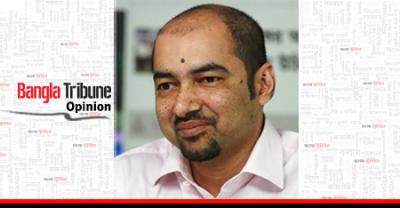 It is commonplace among intelligentsia of developing nations that any military spending detracts from investment in people's needs. It can indeed seem so; tanks or fighter jets don't seem to benefit people on a daily basis the way schools or tube-wells do. But this is a deeply partial and flawed view of statecraft.
It is commonplace among intelligentsia of developing nations that any military spending detracts from investment in people's needs. It can indeed seem so; tanks or fighter jets don't seem to benefit people on a daily basis the way schools or tube-wells do. But this is a deeply partial and flawed view of statecraft.
The importance of adequate defenses for Bangladesh was brought to the fore again with great immediacy during the recent Rohingya crisis. At the peak of Myanmar's genocide and expulsion of the Rohingyas last September, the Myanmar army repeatedly buzzed our airspace, laid mines along the border, and moved military assets to aggressive forward positions.
The government of Sheikh Hasina displayed great patience and astuteness in denying the Myanmarese army a so-called "one week war"; they might have liked to smuggle their genocide and ethnic cleansing under the banner of a "war." While that crisis passed without incident, we can no longer allow Myanmar to gain a significant military edge on us.
Anyone who would still want to ply tired old adages about "military spending is a waste" cannot be taken seriously in discussions of statecraft. Not in an era when the whole world is becoming ever more volatile.
Luckily, under the leadership of Sheikh Hasina, our armed forces have devised a comprehensive strategic plan to modernize itself. Billed as the Forces Goal 2030, this plan provides a strategic framework not only for extensive and necessary purchases, but also for actual capacity enhancements. While jets, subs and missiles are "glamorous" big-ticket items that pique public interest, an army actually needs a lot else that is very prosaic but as crucial as weapons: communication and surveillance, transport and logistics.
Forces Goal 2030 addresses all that. Plans include building new cantonments and naval and air bases. The plans also call for increasing our capacity to manufacture more weaponry ourselves, including larger ships and eventually base-level fighter jets. It is really heartening to see that even though our intellectuals are lagging in their thinking on national security and defense, the political leadership is boldly committed in this crucial area.
The armed forces too have shown their professional acumen in devising plans that are actually quite economical and incorporate the latest thinking. The plans, for example, don't call for a sheer increase of numbers, though that would be easy enough for a country where cheap and eager labor is plentiful. Instead, the Forces Goal 2030 plans for "Future Soldiers" so as to leverage technology to magnify actual efficacy; this is smart and advanced thinking.
So, the need is eminent and the plans are smart and timely.
However this may still not be good enough. Three further things need to happen:
1. Given how the world and the region is becoming more volatile, we need to review whether 2030 is soon enough. We may want to look at speeding it up to become Forces Goal 2025, and aim to gain even more critical advantages over our most proximate threats by 2030: for example, in terms of area denial strategy.
2. We should seriously review whether we should depend as much as we do now on our traditional suppliers; namely, Russia and China. We definitely cannot, and don't wish to, stop working with long-standing defense partners like them, but we can certainly re-calibrate the level of dependency. There are two good reasons for this:
a. We cannot get the best deals if we don't have alternatives. As it happens, there are great alternatives in the world market. The thinking that Third World countries can't afford anything Western is dated Cold War thinking. To give a few quick examples: MiG-35's might be a front-runner in our next generation jet purchase, but the Swedish Gripen NG's are better in many respects, and excellent value-for-money. Similarly, Swedish Gotlands may be a better option than Russian Kilo-class subs. The Italian Aeromacchi 346’s are as good as the Russian Yak-130s; they were the same company until quite recently.
b. The other reason to widen our choices is political. Russia and China both lent support to Myanmar over the Rohingya crisis. This is deeply disappointing for us. They could have tried for a more neutral position, even if they could not give us support; instead, they tilted towards Myanmar. Diversifying our sources even a little may encourage long-standing partners to be more sensitive to our needs in a moment of crisis.
3. And, finally, we need both our army and our intelligentsia to change their outlook on how we think and talk about defense. The army cannot go on being as hidebound as it has been so far. It must engage and educate the public; that too is crucial to becoming a nation with a strong and true national defense capability. And our intellectuals need to shed limited views of national spending and take up in earnest a philosophical and strategic study of what it means to be a sovereign nation – and everything that that requires. We need national defense issues, including military purchases, to be discussed and debated both in parliament and in the media. The example of the degree of openness in this regard even in next-door India can be instructive.
Bangladesh is no longer a country that depends on anyone's charity. It has outpaced neighbors in social development and attained eligibility to become a middle-income country. If our current rate of growth is sustained, we have every chance to become a power-house of a nation – and we should aspire to be nothing less.
The idea that we only wish to be prosperous – not powerful – rests on a false dichotomy: one cannot be prosperous if one also doesn't have the capabilities to be powerful, in every sense.
So, as we approach our 50th anniversary as a nation, let us shed our shyness about matters of defense, and plan together how we will safeguard all our gains as a sovereign nation.
We must reach a stature so that a country like Myanmar will never dare again to act so aggressively with us. We cannot simply expect others to grant us the respect we deserve – it must be earned and also defended.
K. Anis Ahmed is publisher of the Bangla Tribune
 Opinion
Opinion
41364 hour(s) 15 minute(s) ago ;
Morning 07:09 ; Sunday ; Jul 06, 2025
Time to power up
Send
K. Anis Ahmed
Published : 11:01, May 13, 2018 | Updated : 19:08, May 13, 2018
Published : 11:01, May 13, 2018 | Updated : 19:08, May 13, 2018
0 ...0 ...
/zmi/up-pdn/
***The opinions, beliefs and viewpoints expressed in this article are those of the author and do not reflect the opinions and views of Bangla Tribune.
- KOICA donates medical supplies to BSMMU
- 5 more flights to take back British nationals to London
- Covid19: Rajarbagh, Mohammadpur worst affected
- Momen joins UN solidarity song over COVID-19 combat
- Covid-19: OIC to hold special meeting
- WFP begins food distribution in Cox’s Bazar
- WFP begins food distribution in Cox’s Bazar
- 290 return home to Australia
- Third charter flight for US citizens to return home
- Dhaka proposes to postpone D8 Summit
Unauthorized use of news, image, information, etc published by Bangla Tribune is punishable by copyright law. Appropriate legal steps will be taken by the management against any person or body that infringes those laws.
Bangla Tribune is one of the most revered online newspapers in Bangladesh, due to its reputation of neutral coverage and incisive analysis.
F R Tower, 8/C Panthapath, Shukrabad, Dhaka-1207 | Phone: 58151324; 58151326, Fax: 58151329 | Mob: 01730794527, 01730794528


